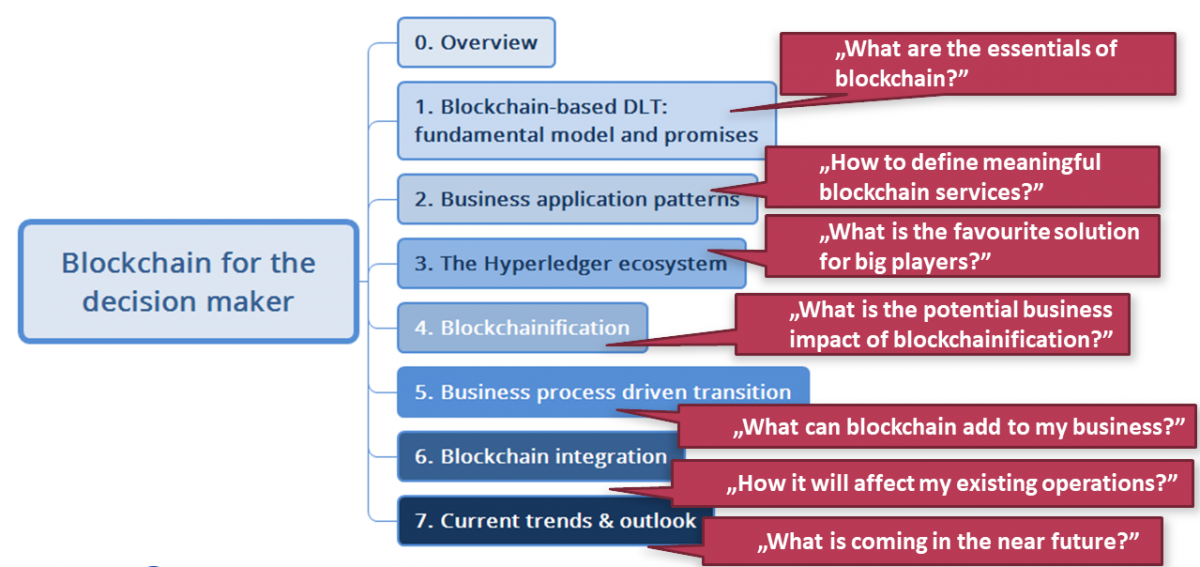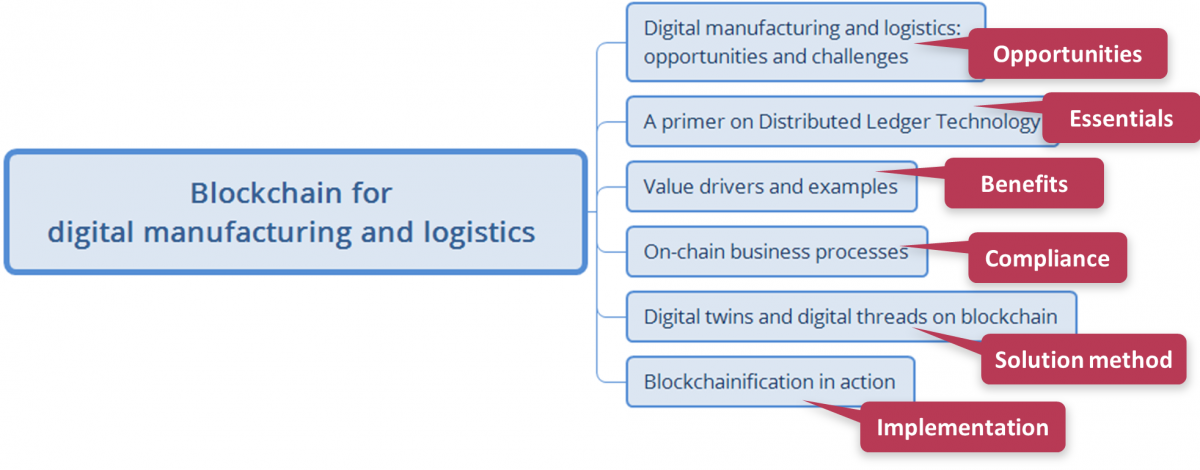Blockchain-related activities of BME MIT FTSRG
News
21/10/2020 - Our paper on "Using Fault Injection to Assess Blockchain Systems in Presence of Faulty Smart Contracts" (Open Access) is being published in IEEE Access, a Q1 journal. The paper presents the results of the project “Advanced Analytics for Empirical Assessment of Cloud Resilience”, granted by the bi-lateral program Portugal-Hungary in cooperation with colleagues from the University of Coimbra.
01/06/2020 - We are happy to announce a new professional course at the Budapest Institute of Banking (BIB), with the title "Blockchain - Beyond cryptocurrencies: the many roles of blockchain in digital transformation".
01/03/2020 - In cooperation with the European Institute of Technology - EIT Digital, we are preparing a new EIT Professional School offering on Blockchain-based application design; with an emphasis on digital manufacturing and modern logistics.
Research
The foundation of our research is the decades-long background of the research group in dependability, fault-tolerance, model-based system engineering, verification, and validation (V&V) of critical systems and intelligent system management.
Validation and verification of smart contracts
The correct and robust behavior of smart contracts is a fundamental requirement in any blockchain-based solution. We are working on novel approaches to systematically and expressively inject software faults into smart contracts - not only to assess the efficiency of V&V tools at development time but also to assess the impact of not-caught smart contract faults on the blockchain system as a whole during operation. Part of this research is to create smart contract code and platform-level dependability mechanisms to increase dependability at the systemic level.
A member of the research group, Ákos Hajdu is also involved in research at SRI International (Menlo Park & New York) which targets smart contract specification and verification using formal methods. More information can be found in the references below.
- VSTTE 2019: solc-verify: A Modular Verifier for Solidity Smart Contracts (paper)
-
ESOP 2020: SMT-Friendly Formalization of the Solidity Memory Model (paper)
- Also presented at SMT 2020, see talk recording
- Also presented a WoSCA 2020, see talk recording
- Solidity Summit 2020: solc-verify, a source-level formal verification tool for Solidity smart contracts (talk recording)
-
FMBC 2020: Formal Specification and Verification of Solidity Contracts with Events (preprint)
- See also a recording of the talk
Empirical performance engineering for distributed ledgers
Our work on distributed ledger performance analysis began with a 2016 IBM Faculty Award, granted to Prof. András Pataricza. The work was performed in cooperation with Duke University; we created an empirical approach for efficient bottleneck identification and analysis for Hyperledger Fabric 0.6 (see, e.g., our International Journal of Cloud Computing paper). Research on intelligent support for creating qualitative abstractions of performance measurements is an ongoing activity.
More information can be found in the references below.
- IJCC 2018: Systematic Performance Evaluation Using Component-in-the-Loop Approach (paper, presentation), presenting an iterative approach based on measurement-driven drill-down to a fine granular bottleneck identification.
- ICACON 2018: A Blockchain-based Critical Event Data Recorder for Cyber-Physical Systems (extended abstract) describes the use case for storing high-rate operation logs related to critical situations in cyber-physical systems for a posteriori diagnostics.
Model-based system engineering for distributed ledgers
Due to the criticality of intended applications as well as the requirement that smart contract-based cooperation logic has to be "right in the first version", we are performing research to bring model-based system engineering techniques - in a simplified way: generating smart contracts from engineering and business models - to distributed ledgers.
For generating native Hyperledger code from Business Process Model and Notation (BPMN) models, Attila Klenik won a 2017 Hyperledger Summer Internship and Dr. László Gönczy won an advising position in the program. Attila researched and prototyped an approach for automatically generating smart contracts from BPMN-based business process models to run on the Hyperledger Fabric platform. Lately, we have been cooperating with Quanopt Kft on bringing the approach to other languages (as Hyperledger Concerto) and platforms.
We also created and published an approach to generate Solidity smart contracts from Yakindu statecharts. Work is underway to create generative support for DAML and languages supported by Hyperledger Fabric.
More information can be found in the references below.
- DSN-W 2018: Towards Model-Driven Engineering of Smart Contracts for Cyber-Physical Systems (paper), presenting an initial approach for generating smart contracts from statecharts, for coordinating the usage of cyber-physical system elements.
- ICACON 2018: Collaboration Orchestration in Hyperledger Fabric with BPMN Processes (extended abstract, presentation), presenting a model-driven approach to generate Hyperledger Fabric smart contract skeletons from standard BMPN business processes.
Hyperledger, standardization
BME is an academic member of the Linux Foundation and specifically the Hyperledger project. Group members are active in the Performance and Scalability Working Group, where Dr. Imre Kocsis was a contributor to the Whitepaper on Blockchain Performance Metrics.
Dr. Imre Kocsis is also a co-organizer of the local Hyperledger Meetup. In 2019, a student of Dr. Kocsis (Balázs Prehoda) also won and successfully executed a Hyperledger Summer Internship.
Dr. Imre Kocsis is the national delegate to ISO/TC 307, the standardization committee for Blockchain and distributed ledger.
The work on empirical performance engineering seeded our involvement with Hyperledger Caliper. Attila Klenik is one of the core developers of Caliper, a flexible, scalable, and highly extensible tool for the performance benchmarking of blockchain platforms.
In addition to his Hyperledger Summer Internship as a student in 2017, Attila Klenik was a mentor in the 2019 program, co-mentoring a university student from the USA on extending Caliper with a web-based GUI for real-time feedback on the running performance benchmark.
Education
Our course on "Blockchain Technologies and Applications" puts an emphasis on industrial and enterprise solutions and was the first university-level blockchain course in the country to offer a system design-oriented blockchain/distributed ledger curriculum.
Prof. Pataricza is advising an ongoing PhD topic in the domain.
We regularly advise MSc/BSc theses as well as student research papers in the field. An indicative selection of topics:
- dr. Bálint Fehér (MSc, 2020 spring): Consortial Hyperledger applications in clinical trials
- Balázs Prehoda (BSc, 2019 spring): Dependability assessment of distributed ledgers using fault injection
- Benjámin Gehl (BSc, 2018 Fall): Statechart-based development of smart contracts for consortial blockchains
- Péter Garamvölgyi (BSc, 2017 Fall): Blockchain-based control of device access in cyber-physical systems
Professional education and courses
We have been providing professional education on blockchain and distributed ledger technologies locally and internationally since 2017.
Cooperation with EIT Digital
We have an ongoing cooperation with EIT Digital since 2019 under their EIT Digital Professional School programme. EIT is the European Institute of Innovation and Technology, an EU body created by the European Union in 2008 to strengthen Europe’s ability to innovate. EIT is an integral part of Horizon 2020.
Our first course, "Blockchain for the decision maker" focuses on the main aspects and impacts of introducing disruptive blockchain technologies into existing business operations and IT systems.
A summary of the course is available at Coursera in the form of a nano-MOOC.

Our second course "Blockchain for digitial manufacturing and logistics", available from Q4 2020, is a specialized version focusing on the needs and challanges of the Digital Manufacturing, including related aspects of logistics and connections to important standards (like GS1) and best practices.

Target audience:
- CTOs/CIOs
- product owners
- leading architects
For course dates, visit the EIT Professional School page or get in touch with us at blockchain AT mit.bme.hu!
Cooperation with Budapest Institute of Banking
We are happy to cooperate with Budapest Institute of Banking (BIB), a leading entity in professional education in the Hungarian financial/banking sector. Our course " Beyond cryptocurrencies: the many roles of blockchain in digital transformation" presents how (enterprise) blockchain applications can change the business cooperation across stakeholders, with presenters from the Hungarian National Bank, introducing regulatory aspects of the field.
Talks
Our staff members gave presentations at Hyperledger Global Forum 2018, the bi-annual worldwide event for Hyperledger:
Imre Kocsis: Teaching Blockchain to University Students and Professionals - Approach, Experiences, and Reflections. (talk on YouTube, slides)
László Gönczy: Business Process Support for Consortial Blockchain (talk on YouTube, slides)
Contact & industrial engagements
In addition to our professional courses, we provide consultation and R&D services. You can reach out to us through blockchain AT mit.bme.hu, or by getting directly in touch with Dr. Imre Kocsis.
Publications
- Hajdu, Á., Ivaki, N., Kocsis, I., Klenik, A., Gönczy. L., Laranjeiro, N. Madeira, H. & Pataricza, A. (2020): Using Fault Injection to Assess Blockchain Systems in Presence of Faulty Smart Contracts. IEEE Access, Early Access, DOI: 10.1109/ACCESS.2020.3032239, IEEE.
- Hajdu, Á., & Jovanović, D. (2020): solc-verify: A Modular Verifier for Solidity Smart Contracts. In: Chakraborty S., Navas J. (eds) Verified Software. Theories, Tools, and Experiments. VSTTE 2019. Lecture Notes in Computer Science, vol 12031, DOI: 10.1007/978-3-030-41600-3_11, Springer, Cham.
- Hajdu, Á., & Jovanović, D. (2020): SMT-Friendly Formalization of the Solidity Memory Model. In: Müller P. (eds) Programming Languages and Systems. ESOP 2020. Lecture Notes in Computer Science, vol 12075. DOI: 10.1007/978-3-030-44914-8_9, Springer, Cham.
- Kocsis, I., Klenik, A., Pataricza, A., Telek, M., Deé, F. & Cseh, D. (2018): Systematic performance evaluation using component-in-the-loop approach. International Journal of Cloud Computing, Vol. 7, No. 3/4, pp 226-257, DOI: 10.1504/IJCC.2018.095401, Inderscience.
- Garamvölgyi, P., Kocsis, I., Géhl, B. & Klenik, A. (2018): Towards Model-Driven Engineering of Smart Contracts for Cyber-Physical Systems. In: 2018 48th Annual IEEE/IFIP International Conference on Dependable Systems and Networks Workshops (DSN-W), pp 134-139, DOI: 10.1109/DSN-W.2018.00052, IEEE.
- Klenik, A., Gönczy, L., Pataricza, A. & Kocsis, I. (2018): Collaboration Orchestration in HyperledgerFabric with BPMN Processes. Extended abstract, Presented at the IBM International Cloud Academy Conference (ICACON) 2018, available here.
- Pataricza, A., Klenik, A., Földvári, A. (2018): A Blockchain-based Critical Event Data Recorder for Cyber-Physical Systems. Presented at the IBM International Cloud Academy Conference (ICACON) 2018, available here.
- Hyperledger Performance and Scale Working Group (2018): Hyperledger Blockchain Performance Metrics. Technical Report, available at: https://www.hyperledger.org/learn/publications/blockchain-performance-metrics


